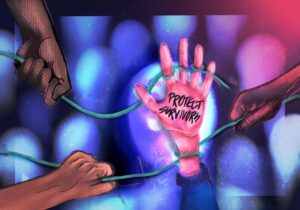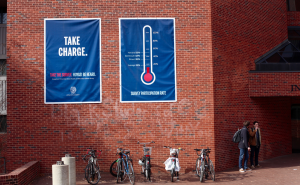Content warning: This article discusses sexual assault and harassment.
When Rebecca Friedman (COL ’24) chose to attend a bystander intervention training workshop during the Summer Hilltop Immersion Program (SHIP), she learned strategies for effectively intervening when someone is misgendered. After Kiely Johnson (COL ’23) went to a training in Sept. 2019, she started paying more attention to her friends’ safety at parties—especially if they were drinking or left alone with another person.
Prior to the pandemic, Bystander Intervention Training was required for all first-year and transfer students and focused primarily on sexual assault prevention. The training was made mandatory in 2017, meaning that in 2020, first-years, sophomores, and juniors had gone through the workshop.
As of Dec. 1, however, no first-years and few sophomores or transfer students have completed the training. This fall, Health Education Services (HES) did not hold any Bystander Intervention Training workshops, which teach students how to safely intervene in situations of alcohol consumption, sexual assault, or harassment. Workshops during SHIP were optional—because more in-person workshop sessions were planned for fall 2021—and addressed other types of harassment like repeated misgendering.
Georgetown administration and HES pushed the workshops back to the spring 2022 semester without notifying students or providing alternative safety instruction. “Bystander training will be launching in January 2022, and will prioritize fall 2021 new first year and transfer students. Students will be notified when the training is available,” a university spokesperson wrote in an email to the Voice.
The in-person training provides comprehensive strategies and support for students to understand their role as bystanders, equipping them both to intervene in situations of interpersonal violence and give proper consent, according to the Student Health Services website. The page has not been updated to reflect the postponement of workshops.
Pre-pandemic intervention workshops trained around 30 to 70 students at a time, and were led by an instructing graduate student and undergraduate assistant, both affiliated with HoyUS. Students were asked to discuss and decide how to intervene in various bystander scenarios—including a theoretical situation in which a couple is in a heated argument and another where a person repeatedly misgenders a student. Though the bystander training was not a perfect solution to interpersonal violence, Campus Climate surveys show an increased rate of intervention in concerning or dangerous situations as a direct result of the sessions.
A combination of factors, including staffing cuts (the interpersonal violence and education training specialist position at HES remains unfilled) and the pandemic-induced virtual learning environment led to the university’s decision to postpone training workshops. At the same time, the risks associated with being a student on campus, especially new students in the opening weeks of the semester, did not disappear. Coupled with reduced hours of operation for the Georgetown Emergency Response Medical Service (GERMS) and widespread mistrust of university police, scant resources were available to students in harmful situations involving alcohol or interpersonal violence this fall semester.
As recently as Oct. 15, the university had asserted in a Campus Climate email that workshops would take place during this fall semester, but students never received information about when, where, and how they would be conducted, nor how to sign up. Despite multiple emails sent to first years, sophomores, and transfer students stating that the training needed to be completed before students could register for spring 2022 courses, no workshop dates or times were set this semester.
In the past, students took the training early in their time at Georgetown—Johnson, for example, attended a workshop in the early weeks of her first year and Friedman attended one less than a month into SHIP. By spring 2022, first years, sophomores, and many transfer students will already be more than a semester into their in-person experience at Georgetown.
For many, that means having already attended parties and experienced situations the bystander intervention workshop is designed to address. Spring workshops may be too late for those students. Sexual assault is more likely to take place during a student’s first semester—a time commonly referred to as the red zone—than at any other point during their undergraduate career. About half of all instances of undergraduate sexual assault take place between August and November.
“[The person leading the workshop] talked about different events that could happen, and opened up to the group and asked, ‘What do you think you could do in this situation?’ Then she gave feedback on what we thought,” Friedman said of her voluntary training during SHIP. “I thought it was a really open and welcoming environment. I felt very comfortable.”
Both Friedman and Johnson reported that they feel more prepared should a situation arise in which they were a bystander to an uncomfortable or unsafe situation.
“If I’m at a social gathering, or a party nowadays, I’m more conscious of if I see someone leaving with someone of what kind of state they’re in. I feel like I’m always paying attention to that,” Johnson said.
Despite its lateness, mandatory bystander intervention training remains essential. A 2019 survey of 33 universities, including Georgetown, estimated that 13 percent of undergraduate students and over a quarter of undergraduate women have been subjected to nonconsensual sexual contact during their time on campus.
As of 2019, Center for Student Engagement policies also maintained a requirement for clubs to send a certain number of students to a “HoyUs: Leadership Bystander Training” to ensure club leaders had proficiency in hosting positive party environments and cultivating positive club culture. These trainings have also disappeared, arguably making social environments themselves more unsafe for students.
In the absence of university guidance, student organizations have made efforts to adequately equip students with the resources they need for potentially violent scenarios. Sexual Assault Peer Educators (SAPE), for example, holds workshops centered on bystander intervention, consent, and interpersonal relationships for many of Georgetown’s clubs and organizations. Sexual Assault, Relationship Violence & Stalking Services (SARP) provides online and in-person resources about sexual assault, as well as legal help, medical care, and support to survivors.
Hiring for the vacant HES training specialist position is a step toward being able to offer resources to students once more. According to the job listing, still open as of Dec. 1, the specialist’s roles will include implementation and administration of bystander intervention training workshops and other online education courses, such as the AlcoholEDU Canvas modules.
“We know the important role this position plays, and finding an appropriate replacement is a top priority,” the Oct. 15 email read.
The university has yet to communicate to students that the workshops will be taking place in the spring, and did not respond to Voice inquiries about the reasons why bystander training workshops have yet to take place. As of Dec. 1, the administration has not communicated any of this information to the student body.
Many students—particularly those who have already completed workshops and understand the value of the skills it teaches—remain concerned about the lack of training and communication.
“I feel like coming in as a freshman or like a new student, it should be happening,” Johnson said. “Especially if you’ve never lived in a dorm before and you’ve never gone to parties with big groups of people—I think it would make a lot of people feel more comfortable if everybody were educated at least somewhat.”





